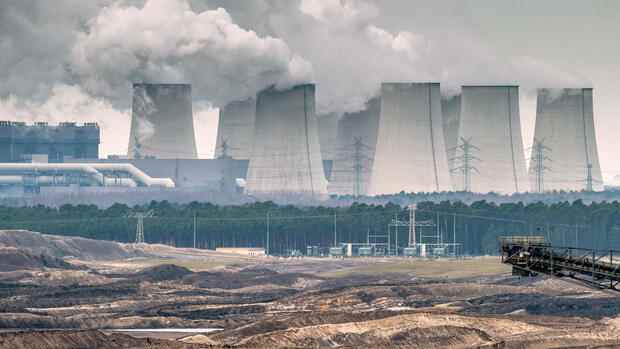Lawyers and NGOs now emphasize that they have already filed more than 80 climate lawsuits around the world to get governments to do more climate protection – “from the Netherlands to Nepal, from Canada to Colombia, from Belgium to Brazil, from Norway to New Zealand, from… South Africa to South Korea”.
(Photo: dpa)
Berlin For the first time, lawyers and numerous non-governmental organizations (NGOs) have joined forces to force states to do more to protect the climate. “Climate measures are a legal obligation,” says an open letter from more than 20 NGOs, which is available to the Handelsblatt. “After decades of empty promises, it’s time to really act and take responsibility.”
Extreme weather events have caused devastating damage on all continents this year alone, it warns. The time window to ensure a livable and sustainable future for everyone is closing.
The advocates and activists are calling for greenhouse gas emissions to be cut drastically in order to limit the average global temperature to a 1.5 degree Celsius increase over pre-industrial levels. The letter was signed in Germany by the organizations Germanwatch and Protect The Planet and is based on an impulse from the Urgenda Foundation’s Climate Litigation Network.
In 2015, the international community agreed in the Paris climate protection agreement to limit global warming to less than two degrees, preferably 1.5 degrees. At the last world climate conference in Glasgow, Scotland, the goal of limiting the increase in global average temperature to 1.5 degrees was reaffirmed, the letter says.
Top jobs of the day
Find the best jobs now and
be notified by email.
However, countries’ climate commitments showed “that we are completely off track”. Less than ten countries have fulfilled their task of increasing their climate targets this year. The international community had agreed on this in Glasgow.
More than 80 climate lawsuits worldwide
New figures recently showed that no major industrialized country is currently on course for 1.5 degrees. With emissions from industry, transport and energy, the seven largest countries (G7) are heading for global warming of 2.7 degrees, criticized the non-profit organization CDP.
The lawyers and NGOs now emphasize that they have already filed more than 80 climate lawsuits around the world to get governments to do more climate protection – “from the Netherlands to Nepal, from Canada to Colombia, from Belgium to Brazil, from Norway to New Zealand, from South Africa to South Korea”.
>> Read also: The energy transition is the solution, not the problem
German lawyer Roda Verheyen, who specializes in environmental law, explained: “Climate processes give the Paris Agreement bite.” In this way, voluntary commitments would be transformed into binding targets. At the same time, it ensures that governments implement their goals with the necessary ambition. “Governments cannot escape the courts,” Verheyen said.
In fact, climate lawsuits have increased around the world. This is shown by the June study “Global trends in climate change litigation” by the London School of Economics. Accordingly, the number of climate lawsuits around the world has more than doubled since the signing of the Paris climate protection agreement. A quarter of these climate lawsuits were filed between 2020 and 2022.
UN obliges Australia to compensate Torres Strait Islands
The number of procedures remains manageable. The study speaks of 2002 cases worldwide. However, 54 percent of the most recently decided procedures ended in favor of climate protection.
In Germany, the climate decision of the Federal Constitutional Court published in April 2021, which ordered the legislature to “intertemporal safeguarding of freedom”: Today’s political decisions are linked to a duty of care for future generations. Since then, however, further complaints with the request to achieve more climate protection have failed.
In many cases, climate protection activists or non-governmental organizations such as Deutsche Umwelthilfe are behind the processes, which are led by individuals, such as organic farmers.
Activist shareholders with multi-billion dollar lawsuits
Not only countries have to answer to judges for more or less adequate climate measures. Companies are also increasingly exposed to climate lawsuits.
Most recently, the higher regional court in Hamm even made its way to Peru to assess the consequences of climate change on site because of a lawsuit against RWE. A Peruvian small farmer is suing the German company because its CO2 emissions are partly responsible for the melting of a glacier in the Andes. The melt water now threatens his house and village. The lawsuit is supported by Germanwatch.
There are numerous lawsuits against car manufacturers in this country. With a lawsuit accompanied by Greenpeace before the Detmold district court, VW is to be forced to stop the production of climate-damaging combustion engines by the end of the decade at the latest.
And experts like the director of the Institute for Applied Business Law at the HSBA Hamburg School of Business Administration, Daniel Graewe, predict that billion-dollar “climate lawsuits” by activist shareholders are just now being written. The affected companies would be under pressure for years. Numerous climate lawsuits are also pending at the European Court of Human Rights.
More: More than 6.6 billion euros a year – this is how expensive extreme weather is for Germany
